The History Book Club discussion
MEDIEVAL HISTORY
>
TODAY IN MEDIEVAL HISTORY
date newest »
newest »
 newest »
newest »
JANUARY 17th
EVENTS
1377: Papacy is returned to Rome
Due to general turbulence among the population of Rome and a strong French influence in the college of cardinals, the papacy had resided in Avignon for more than seventy years. Pope Gregory XI, encouraged by Saint Catherine of Siena, returned the seat of papal power to the ancient city over the protest of French cardinals.
WHO WAS BORN
1342: Philip II, Duke of Burgundy
Philip, also known as Philip the Bold (Philippe le Hardi), was the youngest son of King John II (the Good) of France and one of the most powerful men of his time. As regent for his nephew King Charles VI, who went insane, Philip wielded considerable power and became, in effect, the virtual king of France.
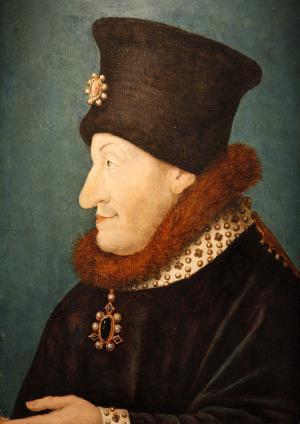
Portrait of Philip the Bold by an unknown artist. Public Domain; courtesy of Wikimedia
1463: Frederick III
After Martin Luther was excommunicated and placed under the imperial ban in 1521, Frederick "the Wise" protected him and offered him sanctuary as the Reformation in Germany began. As an Elector of Saxony, he also worked for constitutional reform of the Holy Roman Empire.
1484: Georg Spalatin
A prolific writer and humanist whose diplomatic finesse helped the Protestant Reformation, Spalatin was also a friend of Martin Luther.
Source for all of the above: http://historymedren.about.com/od/tod...
Author: Melissa Snell
Medieval History Expert
 by Edwin Mullins (no photo)
by Edwin Mullins (no photo)
EVENTS
1377: Papacy is returned to Rome
Due to general turbulence among the population of Rome and a strong French influence in the college of cardinals, the papacy had resided in Avignon for more than seventy years. Pope Gregory XI, encouraged by Saint Catherine of Siena, returned the seat of papal power to the ancient city over the protest of French cardinals.
WHO WAS BORN
1342: Philip II, Duke of Burgundy
Philip, also known as Philip the Bold (Philippe le Hardi), was the youngest son of King John II (the Good) of France and one of the most powerful men of his time. As regent for his nephew King Charles VI, who went insane, Philip wielded considerable power and became, in effect, the virtual king of France.

Portrait of Philip the Bold by an unknown artist. Public Domain; courtesy of Wikimedia
1463: Frederick III
After Martin Luther was excommunicated and placed under the imperial ban in 1521, Frederick "the Wise" protected him and offered him sanctuary as the Reformation in Germany began. As an Elector of Saxony, he also worked for constitutional reform of the Holy Roman Empire.
1484: Georg Spalatin
A prolific writer and humanist whose diplomatic finesse helped the Protestant Reformation, Spalatin was also a friend of Martin Luther.
Source for all of the above: http://historymedren.about.com/od/tod...
Author: Melissa Snell
Medieval History Expert
 by Edwin Mullins (no photo)
by Edwin Mullins (no photo)
 February 11th
February 11thWHO WAS BORN
1466: Elizabeth of York, Queen of England
Elizabeth was the daughter of Edward IV, wife of Henry VII, and mother of Henry VIII. Shortly after her father's death, her parents' marriage was declared invalid, and she and her brothers Edward and Richard were declared illegitimate and barred from succession to the throne.
After Henry Tudor defeated Richard III at the Battle of Bosworth and took the crown, he had the legislation that decreed Elizabeth illegitimate overturned. His marriage to the legitimate daughter of a king bolstered his claim to the throne. At this time Elizabeth's brothers were most likely already dead, but who killed them is still a mystery.
Elizabeth had seven children and died in childbirth on February 11th, 1503.
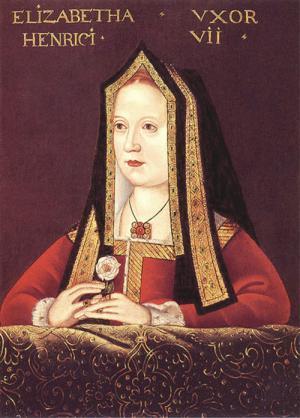
WHO DIED
641: Roman Emperor Heraclius
731: Pope St. Gregory II
Gregory entered church service young and achieved significant responsibilities early in his career, including the posts of subdeacon, papal librarian, and treasurer, before becoming pope in 715. He supported the Eastern Roman Empire, but when Emperor Leo III began his campaign against icons, Gregory opposed him and the controversy over iconoclasm began.
Source
Author: Melissa Snell
 by
by
 Alison Weir
Alison Weir
 [I'm going to post this one day ahead of time so that everyone has the full 24 hours to enjoy all these exciting anniversaries!]
[I'm going to post this one day ahead of time so that everyone has the full 24 hours to enjoy all these exciting anniversaries!]MARCH 4TH
EVENTS
1152: Frederick I elected Holy Roman Emperor
Also known as "Barbarossa" (red-beard), Frederick was frequently at odds with the papacy over issues of authority and was even excommunicated by Pope Alexander III. He was able to consolidate power in Germany but lost territory in northern Italy. Frederick drowned while crossing the Saleph River during the Third Crusade.
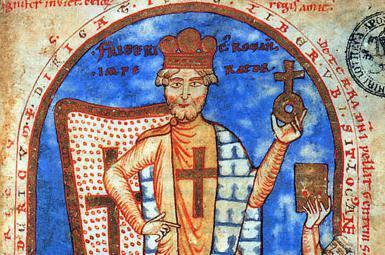
1351: Ramathabodi becomes king of Siam
Ramathibodi set up his capital in Ayutthaya, which as an international port helped increase the prosperity and power of the nation. He also laid the foundations of the Siamese legal system, which was not significantly changed until the 19th century.
1461: Edward IV takes the English throne
In the long and convoluted English Wars of the Roses, Edward and his supporters (including Warwick the Kingmaker), after a victory at Mortimer's Cross, reached London before the rival Lancastrians and was proclaimed king. He then sealed his ascent to the throne with a victory at Towton from which his primary opponent, Henry VI's queen Margaret of Anjou, fled.
WHO WAS BORN
1394: Henry the Navigator
Prince Henry is known primarily for his insatiable interest in exploration and navigation. As a patron of naval sciences, he was responsible for the development of the Portuguese caravel and increased naval commerce as well as advances in cartographic techniques and navigational instruments.
Source, written by Melissa Snell
 by Otto of Freising (no photo)
by Otto of Freising (no photo)
 Thank you, Katie. I saw this post on March 3rd, but then forgot to comment. March 4th was undoubtedly a bad day for Alexander III even if he wasn't aware of it. I think Prince Henry's deeds are exaggerated by traditional History.
Thank you, Katie. I saw this post on March 3rd, but then forgot to comment. March 4th was undoubtedly a bad day for Alexander III even if he wasn't aware of it. I think Prince Henry's deeds are exaggerated by traditional History.
 APRIL 13TH
APRIL 13THEVENTS
1111: Henry V crowned Holy Roman Emperor
Henry restored, for the most part, peace within the empire and was successful in wars with Bohemia, Flanders, Hungary and Poland. He also perpetuated the Investiture Controversy, striving for the rights of the crown over the papacy.
1598: Edict of Nantes promulgated
The edict granted substantial religious liberty to the Huguenots of France, but also restored Catholicism in all areas where Catholic practice had been interrupted in the Wars of Religion.
Source, written by Melissa Snell
 by N. M. Sutherland (no photo)
by N. M. Sutherland (no photo)
 MAY 19TH
MAY 19TH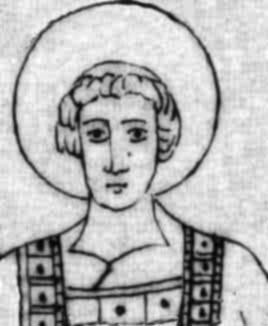
804: Death of Alcuin of York
Alcuin was one of the main cultural and religious advisers to the Emperor Charlemagne. One of the most brilliant scholars of his day, Alcuin contributed to reforming the liturgy, the development of Carolingian miniscule script, and the writing of history and poetry. Much of his influence can be traced back to the vibrant intellectual world of contemporary Northumbria.
1296: Death of Pope Celestine V
One of the most fascinating and obscure medieval popes. Celestine spent the majority of his life as a hermit, and was elected to the See of St. Peter to end an impressively-long stalemate among the cardinal electors. A deeply holy man very much out of his element, Celestine did not last long as pope and abdicated five months after his election. However, the ramifications of his rule lasted long after, casting doubt on the legitimacy of his successor Boniface VIII and fueling the fires of the surging controversies in the Franciscan order.
1342: Clement VI consecrated pope
Clement VI, one of the Avignon popes, was the bishop of Rome during the Black Death. Stories say that he survived in part by adopting one of the more successful superstitious remedies against the plague: he sat in a room between two constantly-burning fires.

1536: Anne Boleyn executed on the order of Henry VIII
Henry was impatient to be rid of the wife who had failed to give him a son and had her charged with adultery. Although she was very likely innocent of the charges against her, she was beheaded.
Source
 by
by
 John B. Bury
John B. Bury by David Burr (no photo)
by David Burr (no photo) by Yves Renohard (no photo)
by Yves Renohard (no photo) by
by
 Hilary Mantel
Hilary Mantel
 JULY 3RD
JULY 3RD1528
The confirmation of the Capuchin Order by Pope Clement VII. The Capuchins were founded by Matteo Bassi in 1520, an Observant Franciscan, who was the newest addition to a long tradition of Franciscans believing that the current state of the order had diverged too far from the original wishes of St. Francis. The Capuchins were originally persecuted by the Church for abandoning their vows to be Observant Franciscans, but they were given shelter by the Calmaldolese monks until Pope Clement VII was won over to their cause. In thanks to the Camaldolese monks, the Capuchins adopted their traditional hoods as part of their habits. This feature lead to them being called Capuichins (from the word for hood, cappuccio).
 by Duncan B. Nimmo (no photo)
by Duncan B. Nimmo (no photo)
 02.04.2016.
02.04.2016.1118: First Crusader King of Jerusalem Dies

Baldwin I, the first crusader King of Jerusalem, was a son of Eustace II, Count of Boulogne, a feudal magnate from northern France who ruled the area near Calais.
King Baldwin I, King of Jerusalem, died on this day in 1118. He was the first king of the Kingdom of Jerusalem in the history of the Crusades. He had succeeded his brother Godfrey of Bouillon, who had refused to accept a royal title, allegedly claiming that he would never wear a kingly crown when Jesus Christ wore a crown of thorns.Baldwin I, however, accepted the title of king.
His dynasty has an interesting origin. Namely, both of them were sons of Eustace II, Count of Boulogne, a feudal magnate from northern France who ruled the area only a few kilometres south of the famous city of Calais. The County of Boulogne had an exceptionally important strategic significance, being situated at a point that lies in or near four modern countries: France, England, Belgium, and The Netherlands.
King Baldwin I died very far away from his homeland. He met his death during a military campaign in Egypt, more precisely near Al-Arish, some 50 km southwest of Gaza. He was buried at the famous Church of the Holy Sepulchre in Jerusalem.
Source: History.info (http://history.info/on-this-day/1118-...)
 20.05. - 21.05.
20.05. - 21.05.685:Battle of Nechtansmere/Dun Nechtain: Picts beat Northumbrians

Pictish stone in the churchyard at Aberlemno Parish Church. The battle scene depicted is generally accepted to be that of the Battle of Nechtansmere.
The Battle of Dun Nechtain or Battle of Nechtansmere (Scottish Gaelic: Blàr Dhùn Neachdain, Old Irish: Dún Nechtain, Old Welsh: Linn Garan, Old English: Nechtansmere) was fought between the Picts, led by King Bridei Mac Bili, and the Northumbrians, led by King Ecgfrith on 20 May 685.
Source: Wikipedia
 by Graeme Cruickshank (no photo)
by Graeme Cruickshank (no photo)878:Syracuse, Italy, is captured by the Muslim sultan of Sicily
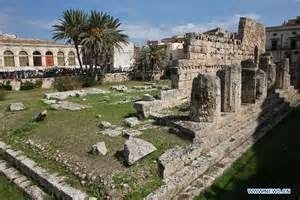
The Muslim conquest of Sicily began in 827 and lasted until 902, when the last major Byzantine stronghold on the island, Taormina, fell. Isolated fortresses remained in Byzantine hands thereafter, but the island was henceforth under Muslim rule until conquered in turn by the Normans in the 11th century.
Although Sicily had been raided by the Muslims since the mid-7th century, these raids did not threaten Byzantine control over the island, which remained a largely peaceful backwater. The opportunity for the Aghlabid emirs of Ifriqiya came in 827, when the commander of the island's fleet, Euphemius, rose in revolt. Defeated by loyalist forces and driven from the island, Euphemius sought the aid of the Aghlabids, who dispatched an army to aid him. Euphemius was quickly sidelined, however. An initial assault on the island's capital, Syracuse, failed, but the Muslims were able to weather the subsequent Byzantine counter-attack and hold on to a few fortresses. With the aid of reinforcements from Africa and al-Andalus, in 831 they took Palermo, which became the capital of the new Muslim province.
The Byzantine government sent a few expeditions to aid the locals against the Muslims, but preoccupied with the struggle against the Abbasids on their eastern frontier and with the Cretan Saracens in the Aegean Sea, it was unable to mount a sustained effort to drive back the Muslims, who over the next three decades raided Byzantine possessions almost unopposed. The strong fortress of Enna in the centre of the island was the main Byzantine bulwark against Muslim expansion, until its capture in 859. The Muslims now increased their pressure against the eastern parts of the island, and after a long siege captured Syracuse in 878. The Byzantines retained control of some fortresses in the north-eastern corner of the island for some decades thereafter, and launched a number of efforts to recover the island until well into the 11th century, but were unable to seriously challenge Muslim control over Sicily.
Under Muslim rule, Sicily prospered and eventually detached itself from Ifriqiya to form a semi-independent emirate. The island's Muslim community survived the Norman conquest in the 1060s and even prospered under the Norman kings, giving birth to a unique cultural mix, until it was deported to Lucera in the 1220s after a failed uprising.
Source: Arianica.com
 by Leonard C. Chiarelli (no photo)
by Leonard C. Chiarelli (no photo)879:Pope John VIII gives blessings to duke Branimir and to Croatian people, considered to be international recognition of Croatian state

The Statue of Duke Branimir in Nin, Croatia
In 879 Branimir had Duke Zdeslav, a supporter of the Byzantine Empire, killed near Knin in a rebellion that he led. Approval from the Holy See was brought about by Branimir's own actions to bring the Croats further away from the influence of Byzantium and closer to Rome. Duke Branimir wrote to Pope John VIII affirming this split from Byzantine and commitment to the Roman Papacy.
During the solemn divine service in St. Peter's church in Rome in 879, Pope John VIII gave his blessing to the duke and the whole Croatian people, about which he informed Branimir in his letters. Pope John VIII brought the very decision on May 21, 879, and confirmed it in his letter from June 7, 879. This was the first time that the Croatian state was officially recognized (at that time the international legitimacy was given by the Pope).
Source: Wikipedia
 by Stjepan Gaži (no photo)
by Stjepan Gaži (no photo)
 04.09.1260. - Battle of Montaperti
04.09.1260. - Battle of Montaperti
Battle of Montaperti, workshop of Pacino da Bonaguida
The Battle of Montaperti was fought on 4 September 1260 between Florence and Siena in Tuscany as part of the conflict between the Guelphs and Ghibellines. The Florentines were routed. It was the bloodiest battle fought in Mediaeval Italy, with more than 10,000 fatalities. An act of treachery during the battle is recorded by Dante Alighieri in the Inferno section of the Divine Comedy. (Source: Wikipedia)
 by
by
 Dante Alighieri
Dante Alighieri
 There are always wars, only the weapons change.
There are always wars, only the weapons change.Interesting effect, the "flying" horses. It would seem that the military "square" wasn't being used yet although some had the right idea.
 That is true, however, sometimes the needs of warfare can produce an evolution in technology. How much longer would it have taken to create atomic weapons had it not been for WWII?
That is true, however, sometimes the needs of warfare can produce an evolution in technology. How much longer would it have taken to create atomic weapons had it not been for WWII?
April 11th
London opens its gates to Edward and the Yorkists - 1471
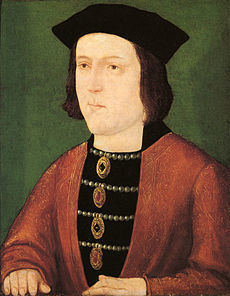
Edward IV
The Earl of Warwick was in Coventry and apparently unwilling to confront Edward, so Edward and Richard marched south to London. London was under the control of Warwick's brother, George Neville the Archbishop of York, but the Londoners were Yorkists and they welcomed the return of their true king. Once inside the city Edward had the Archbishop arrested and along with King Henry VI put in the Tower of London.
 by A.J. Pollard (no photo)
by A.J. Pollard (no photo)
Wyatt executed - 1554

Sir Thomas Wyatt was executed at Tower Hill for leading the rebellion against Queen Mary. Wyatt denied that Elizabeth had been involved in any part of rebellion.
 by Geoffrey Woodward (no photo)
by Geoffrey Woodward (no photo)
London opens its gates to Edward and the Yorkists - 1471

Edward IV
The Earl of Warwick was in Coventry and apparently unwilling to confront Edward, so Edward and Richard marched south to London. London was under the control of Warwick's brother, George Neville the Archbishop of York, but the Londoners were Yorkists and they welcomed the return of their true king. Once inside the city Edward had the Archbishop arrested and along with King Henry VI put in the Tower of London.
 by A.J. Pollard (no photo)
by A.J. Pollard (no photo)Wyatt executed - 1554

Sir Thomas Wyatt was executed at Tower Hill for leading the rebellion against Queen Mary. Wyatt denied that Elizabeth had been involved in any part of rebellion.
 by Geoffrey Woodward (no photo)
by Geoffrey Woodward (no photo)
January 30th, 1121
1121 Coronation of Adeliza of Louvain
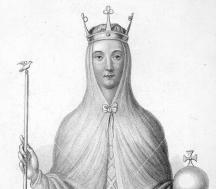
Adeliza of Louvain
Adeliza of Louvain (also called Adela and Aleidis; 1103/1105 to April 23, 1151) was queen consort of the Kingdom of England from 1121 to 1135.
She was the second wife of Henry I. After her husband's death, Adeliza gave shelter to her step-daughter, Empress Matilda, during the civil war between Matilda and Stephen of Blois for the throne of England.
The daughter of Count Godfrey I of Leuven, she married the much older Henry I shortly after the death of his only legitimate heir.
After Henry's death, she married William d'Aubigny, 1st Earl of Arundel, who had been a chief adviser to the king. Seven of their children survived to adulthood.
Although she had remained married to Henry for nearly 15 years, they were unable to produce an heir.
Her grandson, William d'Aubigny, 3rd Earl of Arundel was one of the 25 guarantors of the Magna Carta. She was a patron of the church and spent her final years at Affligem Abbey in Flanders, where she died at the approximate age of 46 or 48 years old.
Lady of the English
Historical Fiction
 by
by
 Elizabeth Chadwick
Elizabeth Chadwick
Synopsis:
Two very different women are linked by destiny and the struggle for the English crown. Matilda, daughter of Henry I, is determined to win back her crown from Stephen, the usurper king. Adeliza, Henry's widowed queen and Matilda's stepmother, is now married to William D'Albini, a warrior of the opposition. Both women are strong and prepared to stand firm for what they know is right. But in a world where a man's word is law, how can Adeliza obey her husband while supporting Matilda, the rightful queen? And for Matilda pride comes before a fall ...What price for a crown? What does it cost to be 'Lady of the English'?
More:
http://www.newworldencyclopedia.org/e...
Source: New World Encyclopedia
1121 Coronation of Adeliza of Louvain

Adeliza of Louvain
Adeliza of Louvain (also called Adela and Aleidis; 1103/1105 to April 23, 1151) was queen consort of the Kingdom of England from 1121 to 1135.
She was the second wife of Henry I. After her husband's death, Adeliza gave shelter to her step-daughter, Empress Matilda, during the civil war between Matilda and Stephen of Blois for the throne of England.
The daughter of Count Godfrey I of Leuven, she married the much older Henry I shortly after the death of his only legitimate heir.
After Henry's death, she married William d'Aubigny, 1st Earl of Arundel, who had been a chief adviser to the king. Seven of their children survived to adulthood.
Although she had remained married to Henry for nearly 15 years, they were unable to produce an heir.
Her grandson, William d'Aubigny, 3rd Earl of Arundel was one of the 25 guarantors of the Magna Carta. She was a patron of the church and spent her final years at Affligem Abbey in Flanders, where she died at the approximate age of 46 or 48 years old.
Lady of the English
Historical Fiction
 by
by
 Elizabeth Chadwick
Elizabeth ChadwickSynopsis:
Two very different women are linked by destiny and the struggle for the English crown. Matilda, daughter of Henry I, is determined to win back her crown from Stephen, the usurper king. Adeliza, Henry's widowed queen and Matilda's stepmother, is now married to William D'Albini, a warrior of the opposition. Both women are strong and prepared to stand firm for what they know is right. But in a world where a man's word is law, how can Adeliza obey her husband while supporting Matilda, the rightful queen? And for Matilda pride comes before a fall ...What price for a crown? What does it cost to be 'Lady of the English'?
More:
http://www.newworldencyclopedia.org/e...
Source: New World Encyclopedia
 On Nov. 29th. 1314
On Nov. 29th. 1314Philippe IV, the Fair dies, and is succeeded by Louis X
Philippe, King of France, died of a hunting accident within the same year as the deaths of the Knight Templar leaders at the stake. His was succeeded by his eldest son Louis X.
http://www.timeref.com/today.php
 My Goodness, Michele! it’s a good thing I took my TBR List off its diet for the Holiday season … otherwise I’d be in trouble over this great review (on “Lady of the English.”) …
My Goodness, Michele! it’s a good thing I took my TBR List off its diet for the Holiday season … otherwise I’d be in trouble over this great review (on “Lady of the English.”) …Regards,
Andrea
 by
by
 Elizabeth Chadwick
Elizabeth Chadwick
Books mentioned in this topic
Lady of the English (other topics)Lady of the English (other topics)
The Wars of the Roses (other topics)
Rebellion & Disorder Under the Tudors 1485-1603 (other topics)
Inferno (other topics)
More...
Authors mentioned in this topic
Elizabeth Chadwick (other topics)Elizabeth Chadwick (other topics)
A.J. Pollard (other topics)
Geoffrey Woodward (other topics)
Dante Alighieri (other topics)
More...




Source: History.com.
More:
https://www.historytoday.com/archive/...
Source: History.com
Please make sure when adding books that you are recommending that you add both the book's cover and the photo or link to the author. This helps populate the site properly.